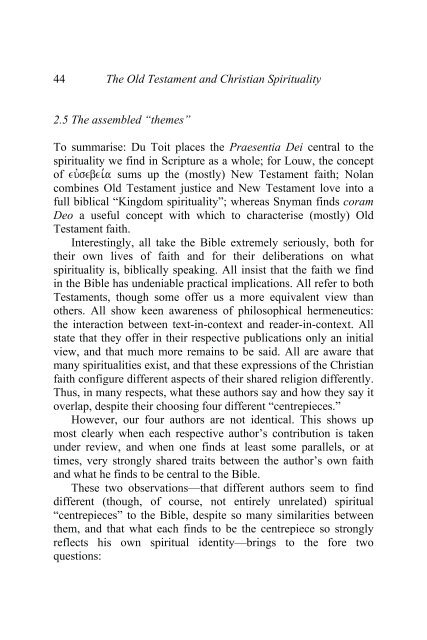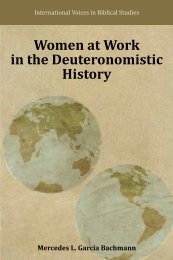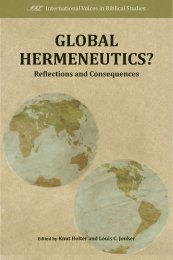The Old Testament and Christian Spirituality - International Voices in ...
The Old Testament and Christian Spirituality - International Voices in ...
The Old Testament and Christian Spirituality - International Voices in ...
Create successful ePaper yourself
Turn your PDF publications into a flip-book with our unique Google optimized e-Paper software.
44 <strong>The</strong> <strong>Old</strong> <strong>Testament</strong> <strong>and</strong> <strong>Christian</strong> <strong>Spirituality</strong><br />
2.5 <strong>The</strong> assembled “themes”<br />
To summarise: Du Toit places the Praesentia Dei central to the<br />
spirituality we f<strong>in</strong>d <strong>in</strong> Scripture as a whole; for Louw, the concept<br />
of euvsebei,a sums up the (mostly) New <strong>Testament</strong> faith; Nolan<br />
comb<strong>in</strong>es <strong>Old</strong> <strong>Testament</strong> justice <strong>and</strong> New <strong>Testament</strong> love <strong>in</strong>to a<br />
full biblical “K<strong>in</strong>gdom spirituality”; whereas Snyman f<strong>in</strong>ds coram<br />
Deo a useful concept with which to characterise (mostly) <strong>Old</strong><br />
<strong>Testament</strong> faith.<br />
Interest<strong>in</strong>gly, all take the Bible extremely seriously, both for<br />
their own lives of faith <strong>and</strong> for their deliberations on what<br />
spirituality is, biblically speak<strong>in</strong>g. All <strong>in</strong>sist that the faith we f<strong>in</strong>d<br />
<strong>in</strong> the Bible has undeniable practical implications. All refer to both<br />
<strong>Testament</strong>s, though some offer us a more equivalent view than<br />
others. All show keen awareness of philosophical hermeneutics:<br />
the <strong>in</strong>teraction between text-<strong>in</strong>-context <strong>and</strong> reader-<strong>in</strong>-context. All<br />
state that they offer <strong>in</strong> their respective publications only an <strong>in</strong>itial<br />
view, <strong>and</strong> that much more rema<strong>in</strong>s to be said. All are aware that<br />
many spiritualities exist, <strong>and</strong> that these expressions of the <strong>Christian</strong><br />
faith configure different aspects of their shared religion differently.<br />
Thus, <strong>in</strong> many respects, what these authors say <strong>and</strong> how they say it<br />
overlap, despite their choos<strong>in</strong>g four different “centrepieces.”<br />
However, our four authors are not identical. This shows up<br />
most clearly when each respective author’s contribution is taken<br />
under review, <strong>and</strong> when one f<strong>in</strong>ds at least some parallels, or at<br />
times, very strongly shared traits between the author’s own faith<br />
<strong>and</strong> what he f<strong>in</strong>ds to be central to the Bible.<br />
<strong>The</strong>se two observations—that different authors seem to f<strong>in</strong>d<br />
different (though, of course, not entirely unrelated) spiritual<br />
“centrepieces” to the Bible, despite so many similarities between<br />
them, <strong>and</strong> that what each f<strong>in</strong>ds to be the centrepiece so strongly<br />
reflects his own spiritual identity—br<strong>in</strong>gs to the fore two<br />
questions:




